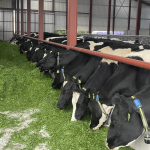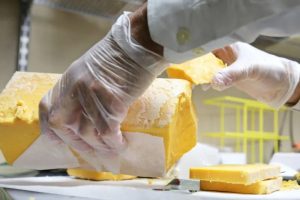
The infant nutrition market is expanding, and consumers increasingly demand ingredients that feature holistic and gut health products with functional and fortifying ingredients. At the same time, technological advances are enhancing the nutritional value, texture, flavor and variety of traditional ingredients. We sat down with Fonterra to discuss this evolving space.
The company highlights that China is a critical market for infant nutrition because of its substantial infant formula market size. Coupled with the implementation of stricter product regulation, the country fosters increased market differentiation and creates numerous prospects for brands to introduce innovative and novel products.
“Across the world, parents continue to be highly invested in their children’s growth and development and are always looking up the latest ingredients and research,” says Angela Rowan, head of innovation advanced nutrition at Fonterra, tells Nutrition Insight. “We see that their concerns are fairly consistent — growth and height, digestive comfort, immune protection, brain development, emotional balance, mobility and energy, obesity and too much sugar.”
“There are also emerging concerns around protection for the environment, such as pollution and increasing use of digital devices for activity levels and eye health.”
Furthermore, data from Innova Market Insights suggests that there has been a 13% annual growth in supplement and sports nutrition launches using dairy proteins, especially whey protein isolate and casein, from July 2021 to June 2023.
The infant formula market
According to Rowan, despite a slowdown in the infant formula market, there remains an increasing interest in ingredients that enhance formula quality, including probiotics, alpha-lactalbumin, phospholipids and milk fat globule membranes (MFGMs) — a tri-layer of polar lipids, glycolipids and proteins that have been shown to support infants’ cognitive development. Fonterra highlights that China’s large infant formula market and strict regulations leads to innovation in the space.
Fonterra highlights that China’s large infant formula market and strict regulations leads to innovation in the space.
Other important ingredients include sn-2 palmitate, which has been shown to support the development of a healthy microbiome, oleic-palmitic-oleic (OPO) acid, peptides and lactoferrin content. Additionally, human milk oligosaccharides (HMOs) are also growing in popularity.
“At Fonterra, we understand the need to research and develop these high-quality ingredients and offerings to meet what parents are looking for, such as hydrolyzed protein-based products for digestive comfort and tolerance,” Rowan explains. “Another trend we have observed is that differentiated positioning for infant formula also revolves around natural formulations such as the use of milk fat rather than palm oil.”
“Organic and grass-fed credentials are also promoted. This trend of more natural formulations with nutritious ingredients and ‘free-from’ artificially produced ingredients is further extended to the children’s food and snacks categories.”
Infant nutrition trends
Rowan spotlights that regulatory changes significantly shape the infant nutrition market trends. For instance, she reveals that China’s implementation of lower protein limits is leading to an increased focus on using higher-quality protein ingredients and amino acid fortification to maintain nutritional standards.
She also notes a shift toward utilizing natural ingredients like whole milk powder and milk fat, which could diminish or eliminate the reliance on palm oil.
“Ingredients like milk fat are valuable and bring multiple benefits thanks to their fatty acid profile, abundance of natural sn-2 palmitate that aid digestion and the presence of MFGMs, she states. “The benefits of these alternatives and higher-quality ingredients form a big part of our research and development at Fonterra.”
“At the same time, plant-based products are also now an early entrant in the infant nutrition space, but therein lies the challenge of achieving the required amino acid profile required in a low protein formulation while still meeting flavor and taste expectations of parents. Fonterra is still exploring the possibilities of these plant-based products for infants with our team of experienced researchers.”
Fonterra’s focus
Rowan explains that Fonterra’s future focus is multifaceted. She states that the company’s ongoing research into human milk is guiding it to create innovative solutions and adds that its major concentration is on specialty MFGM ingredients and examining their role in promoting cognitive and social-emotional development.
“This will require a lot more infant feeding studies and sample collection to provide evidence of long-term safety — a scenario that is unattractive to mothers, researchers, and industry alike,” Rowan underscores. “Outside of the investigation into new ingredients to improve the composition of formula, parents will continue to seek more natural products that have good sustainability credentials.” The company will continue to conduct research into human milk and ingredients and their role in early life development.
The company will continue to conduct research into human milk and ingredients and their role in early life development.
“These demands encourage us to develop better and higher quality offerings to help babies and parents improve their overall health. At Fonterra, we also recognize these challenges and are ready to work closely with regulatory authorities and stakeholders to ensure that our ingredients are well-formulated and safely derived.”
Beyond infancy
At the same time, Rowan states that Fonterra is exploring ways to incorporate key ingredients found in infant formula — like MFGM, probiotics, or lactoferrin — into other food products and snacks, and highlights the potential of ingredients such as its HN001 strain.
The company’s future approach aims to ensure that young children continue to receive these nutrients after transitioning from breast or formula feeding.
Moreover, she details that encapsulation technology is also being used to safeguard ingredients like probiotics, enabling them to endure various product and processing conditions. Fonterra is currently investigating methods to extend these applications beyond traditional powders or capsules.
“HN001 has different benefits, with its immune modulating mechanisms helping protect against eczema and other allergic tendencies and protecting against infection,” she stresses. “HN001 has been shown to support maternal health with potential to reduce risk of gestational diabetes and to improve mental health in adults, such as reduced postnatal anxiety and stress.”
“With our large collection of strains and nearly 100 years of expertise in fermentation and culture production, we are also well placed to deliver a pipeline of new probiotics with differentiated benefits to the market over the coming years,” Rowan concludes.

























